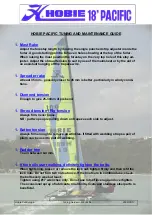
Pic 2 Connection to furling drum
Haul the jib halyard raising the jib sail and cleat to the port side of the mast.
Gather the excess jib halyard and store in the sheet bag.
The single jib sheet will be attached to the tack of the sail in its centre. Pass
one end of the jib sheet from outside the hull through the block mounted
against the mast stay then through the block on the mast assembly and finally
through the cleat. Tie off with a figure of eight knot. Repeat with the other end
of the jib sheet to the other side.
Summary of Contents for TOPAZ TRES
Page 2: ...Picture A Topaz parts Picture B Assembled with sails ...
Page 12: ......






























